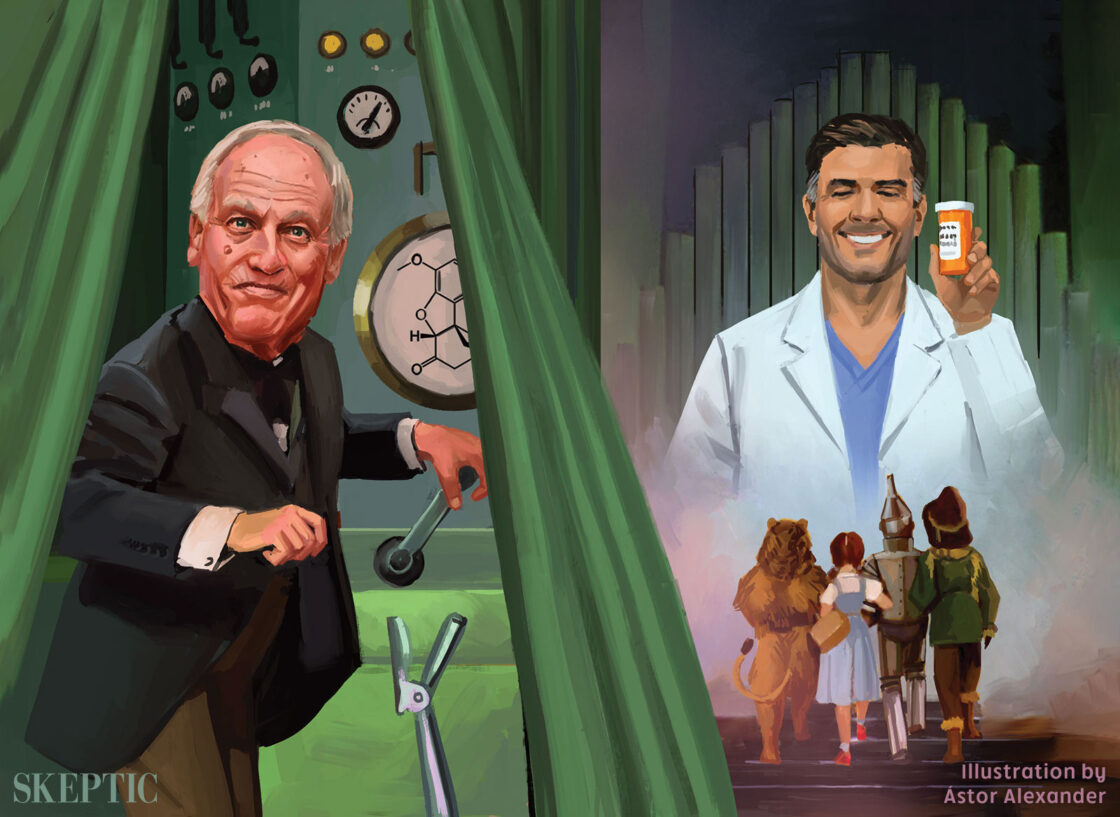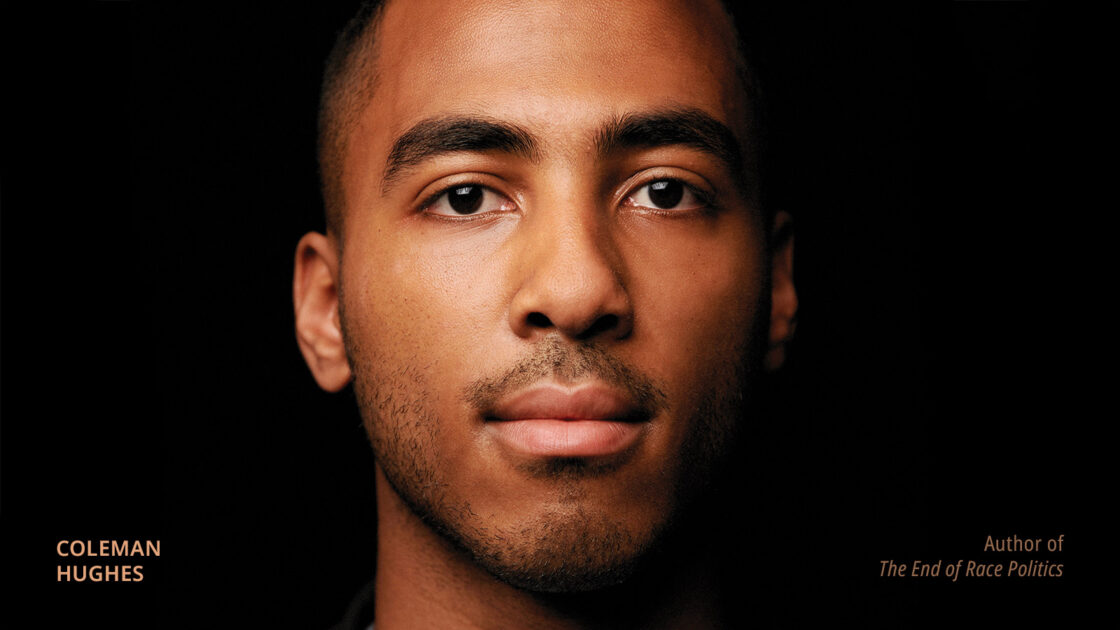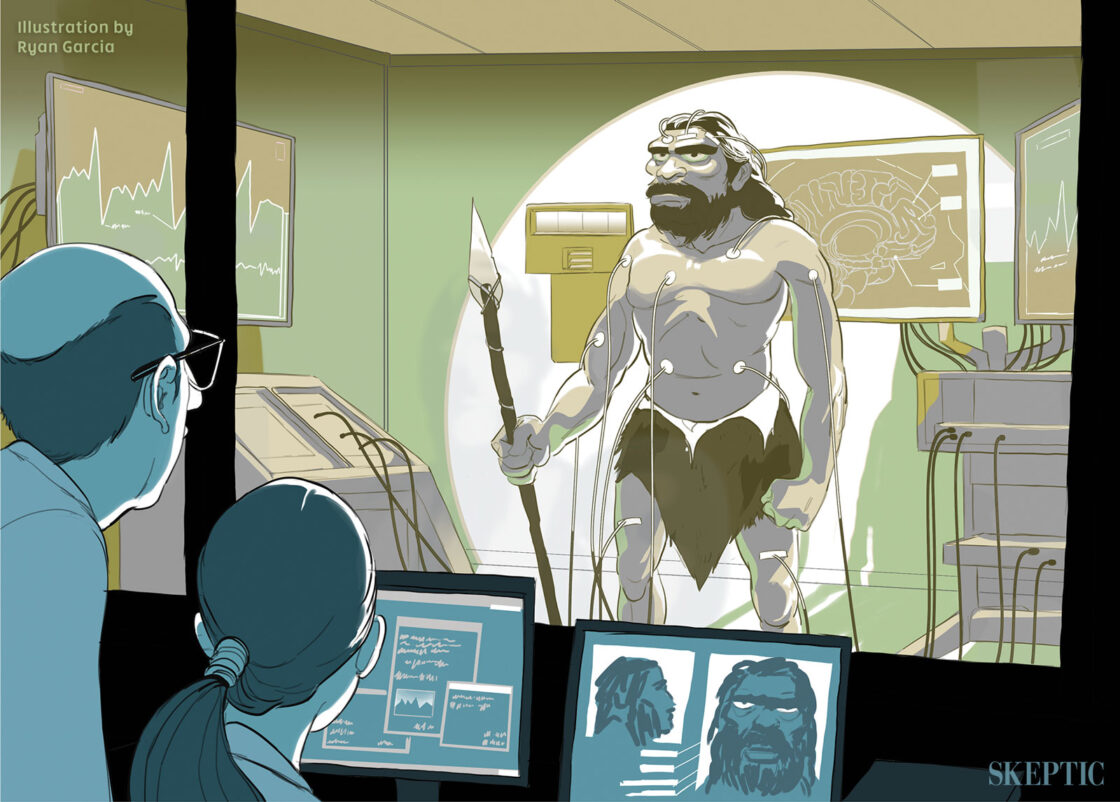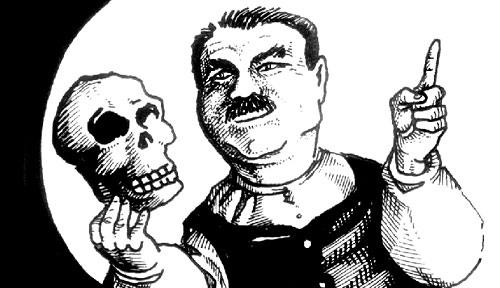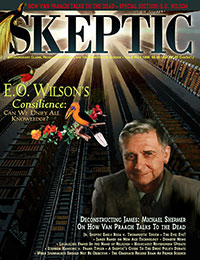The Tragedy of Death —
The Farce of James Van Praagh
The human brain evolved to be exceptional at finding patterns in nature, even when they do not exist or have no real significance — the “eagle rock” overlooking the 134 Freeway in Eagle Rock, California; the “JFK” stone in Hawaii looking for all the world like the late President in profile; the face of Jesus in a tortilla; the Virgin Mary on the side of a building. The first two are amusing but do not strike observers as filled with cosmic meaning. The latter two, for some people, trigger emotional responses linked to spiritual meaning — witness the crowds that appear whenever the Virgin Mary makes her “appearance” on a barn door, in the shadows of trees, or, recently, on the side of the Ugly Duck car rental building in Clearwater, Florida, where the faithful come in wheelchairs and canes to be healed.
We are especially attracted to patterns with a spiritual or religious link, that touch our deepest desire for there to be Something Else out there calling the shots and running the show. For some, that Something Else is God, for others it is angels, spirits, fate, synchronicity, collective consciousness, or some universal life force. For several months over the summer of 1997 the bestselling book in America was about secret codes purportedly hidden in the Bible that, when properly identified and decoded, allegedly predict everything from political assassinations to comet collisions (see my review of The Bible Code in the July 20, 1997, Los Angeles Times or in Skeptic Vol. 5, No. 2).
Throughout the Spring of 1998, the bestselling book in America (#1 on the New York Times bestseller list for 13 consecutive weeks) is by a guy who says he can talk to the dead (on Larry King Live, no less!), and so can you (if you buy his book, of course). It turns out that our loved ones who have “passed over” are not really dead, just on another “spiritual plane.” Since no one really “drops out,” all you have to do is fine tune your frequencies and you too can turn off the Here and Now and tune into that Something Else.
The Medium is the Message
I am referring, of course, to James Van Praagh, the world’s most famous psychic … this year anyway. He has appeared twice, unopposed, on Larry King Live. He was featured on NBC’s Dateline (where James Randi debunked him) and on ABC’s 20/20 (where I debunked him). He has been making the talk show rounds, including Oprah (who was mildly skeptical) and Charles Grodin (who was not skeptical at all), and even had Charles Gibson on ABC’s Good Morning America talking to his dead father (after the spirit offered the breathtaking revelation that Gibson needs new golf club grips).
As an quantitative measure of Van Praagh’s popularity, according to the New York Times his book, Talking to Heaven, has sold more than 600,000 copies (“the spirits said I needed to reach more people”). The book retails for $22.95. Assuming Van Praagh has a standard author’s contract (they are all basically the same with a sliding scale of 10% for the first 5,000 copies sold, 12% for the next 10,000, and 15% thereafter), he is now receiving 15% of $22.95, or $3.44 each. Multiply this by 585,000 gives $2,013,862.50. Add to this his royalties for the first 15,000 copies sold ($11,475 + $27,540) gives a gross royalty statement of $2,052,877.50. Most good literary agents take 15%, leaving him with $1,744,945.80. Not a bad take for a couple of months. Over the course of a year of sales, even after taxes and allowing for returns and deep discounted sales, Van Praagh will be a multi-millionaire. And this does not count his lucrative $200 an hour private consulting business run by his Los Angeles-based company Spiritual Horizons, Inc., which also sells his audio tapes Tuning Into: Intuition and Abundance and Tuning Into: Healing and Forgiveness, his video tape Develop Your Psychic Self, and books his numerous lecture tours, Whole Life Expo appearances, and international cruise ship readings. One psychic “insider” informed me that Van Praagh recently filled a 400-seat hall in Anaheim at $40 a seat, netting a cool $16,000. (In fact, his group business is so successful he has abandoned doing private readings.) By contrast, the bestselling book of the bestselling science author Stephen Jay Gould is The Mismeasure of Man, which in 15 years accumulated about 250,000 in sales, a remarkable amount for a science book, but not even half of what Van Praagh’s book has done in a couple of months. (Please do not misunderstand me. I do not begrudge anyone’s financial success. I am simply using this as a measure of popularity — anyone willing to plunk down $22.95, or $200, must be serious about a belief.)
What is going on here? In my opinion, James Van Praagh is not a psychic. He is not a spiritual medium. He has no paranormal powers, none whatsoever, not one bit. I have never seen him do anything that I could not explain or duplicate myself. Sometimes he comes up with a hit or two, or gets hits that startle everyone, including me, until the videotape is viewed again. Other times his readings are so bad it is embarrassing to watch them. In all cases most of his clients swallow his ramblings hook, line, and sinker; and they are swiftly reeled in for the catch. Why? Who is this guy?
An Actor in Search of a Role
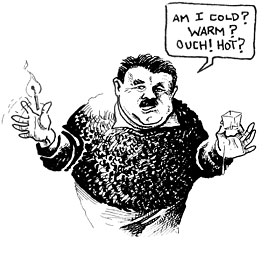
James Van Praagh would appear to have seen fame and fortune in his future years before he became a “psychic.” Biographical details are sketchy at best, but according to Alex Witchel of the New York Times (February 22, 1998), Van Praagh is the third of four children, born and raised Roman Catholic in Bayside, Queens, New York. At one point, he considered becoming a priest. He served as an altar boy and even entered a Catholic prep seminary, the Blessed Sacrament Fathers and Brothers in Hyde Park. His father was Allan Van Praagh, the head carpenter at the Royale Theater on Broadway (where his brother still works). His mother was Irish-Catholic and one of his sisters is a eucharistic minister. While James attended college he found part-time work at the theater where, says Witchel, while the other stagehands were playing cards during the shows, Van Praagh “was out front watching, picking up pointers he still uses for his numerous television appearances.” The lessons were well learned.
His college career was checkered, including enrollments at Queensboro Community College, State University of New York at Geneseo, Hunter College, and, finally, San Francisco State University where he graduated with a degree in Broadcasting and Communications. Subsequently he moved to Los Angeles and began working in the entertainment industry, including Paramont Studios and a stint with the famed William Morris agency in Hollywood. He confesses in his book, Talking to Heaven, “I dreamed of a career as a screenwriter. As luck would have it, while coordinating a conference with the creative staff of Hill Street Blues, I became friendly with one of the show’s producers. When I told him I would be graduating soon, he offered what I thought was my first big break.” After graduation, Van Praagh moved to Hollywood where “I vowed that I would not leave Tinsel Town until I realized my dream and became a writer.” Through a job at William Morris, Van Praagh met a medium who told him “You know, James, you are very mediumistic. The spirit people are telling me that one day you will give readings like this to other people. The spirits are planning to use you.” Van Praagh had found his role in Hollywood. He would act the part of a spirit medium.
In 1994 he was discovered by NBC’s The Other Side, for whom Van Praagh made numerous appearances (as did I) in their exploration of the paranormal. This, and other media appearances, generated countless personal and group readings, pushing him above the psychic crowd and eventually leading to his status as a bestselling author. (The way it works in the media is that once you get in someone’s Rolodex file or computer database, other shows looking for certain guests get the number because the booking agents share information: “I’ll swap you two skinhead Neo-Nazis for a witch and a vampire.”)
Who does James Van Praagh say he is? According to his own website, “Van Praagh is a survival evidence medium, meaning that he is able to bridge the gap between two planes of existence, that of the living and that of the dead, by providing evidential proof of life after death via detailed messages.” Van Praagh calls himself a “clairsentient,” or “clear feeling,” where he can allegedly “feel the emotions and personalities of the deceased.” His analogue, he says, is “Whoopi Goldberg in Ghost.” He CLAIMS that the “spirits communicate by their emotions,” and even though they do not speak English or any other language, they can tell you, for example, “that you changed your pants because of a hole in the left seam or that you couldn’t mail letters today because the stamps weren’t in the bottom right desk drawer.” He readily admits that he makes mistakes in his readings (there are so many he could hardly deny it), rationalizing it this way: “If I convey recognizable evidence along with even a fraction of the loving energy behind the message, I consider the reading successful.” In other words, if he can just get one or two hits, then “convey” the all important emotional psychic stroking that your loved one still loves you, is happy in heaven, and all is right with the world, he has done his job. From the feedback of most of his clients, this is all most people need.
The 39-year old medium’s message cuts to the core of most people’s deepest fears and loftiest desires, as he told the New York Times: “When a reunion between the living and the dead takes place it may be the first time the living understand that death has not robbed them of the love they once experienced with family and friends on the earth plane. With the knowledge of no death, they are free to live life.” No one has explained the attraction of this message better than Alexander Pope did over two and a half centuries ago, in his 1733 Essay on Man:
Hope springs eternal in the human breast;
Man never Is, but always To be blest.
The soul, uneasy, and confin’d from home,
Rests and expatiates in a life to come.
In Why People Believe Weird Things I was satisfied with the “hope springs eternal” explanation for the popularity of such New Age beliefs, but this does not explain precisely how our belief engine drives us to be taken in by such claims. Here I will explore more deeply our willingness to suspend disbelief when it comes to the afterlife.
Gambling on the Afterlife
By way of analogy, consider the gambling games of Las Vegas. Gaming is big business, as anyone can see driving down the ever-burgeoning strip, with one after another casino crying out in neon glare, “can you top this?” Gambling is the best bet in business, far superior to the stock market, as long as you are the house. You only need a tiny advantage on any given game, with lots of customers playing lots of rounds, and you are guaranteed to win. For the roulette wheel, with 18 red slots, 18 black slots, and two green slots (zero and double zero), the take is only 5.26%. That is, by betting either black or red, you will win 18 out of 38 times, or 47.37%, whereas the house will win 20 out of 38 times, or 52.63%. If you placed one hundred $1.00 bets, you would be out $5.26, on average. This may not sound like a lot, but cumulatively over time, with millions of gamblers betting billions of dollars every year, the house take is significant. Other games are better for gamblers. For straight bets in Craps, for example, the house take is a mere 1.4%. For Blackjack, with the most liberal rules and optimal (non-card-counting) player strategies, the house earns just under 1%. These are the best games to play if you are a gambler (that is to say, you will lose more slowly). With other games it is downhill for the gambler. The take for some slot machines, for example, is a staggering 25%. That is, you are losing 25 cents on the dollar, or, the house wins 62.5% and you win 37.5% of the time. Yet people still play. Why?
(It should be noted that these percentages are probabilities over the long run. You can win, of course, if you get ahead and quit. You can also win by “cheating” — as defined by the casinos — by using techniques such as card counting. A friend of mine has spent many years learning the fine art of card counting for Blackjack, but he must now wear disguises and routinely finds himself escorted to the door when discovered in most Las Vegas casinos, apparently a perfectly legal action since the law allows businesses to refuse “service” to anyone they wish. Finally, there are some interesting betting schemes that, at best, delay the inevitable. The “Martingale,” for example, also known as the “double-up-to-catch-up” system, is where you double your bet every time you lose. When you win you have caught up, whereupon you return to your original bet. The problem is that losing streaks will quickly break your personal bank. If you start with a $5.00 bet and lose, say, eight times in a row — not at all unusual — you will bet $10, $20, $40, $80, $160, $320, $640, and $1280, for a total of $2550, and if you lose again you have to be prepared to pony up $2560 over and above the $2550 you just spent. Since most tables have upper limits to betting, and most of us have upper limits to our bank accounts, this prevents the Martingale from being properly applied.)
As B. F. Skinner showed in his experiments with rats, pigeons, and humans, organisms do not need steady reinforcement to continue pressing a bar, pecking a plate, or pulling a one-armed bandit (AKA slot machine). Intermittent reinforcement will do just as well, and sometimes even better at eliciting the desired behavior. A “Variable Ratio Schedule” of reinforcement turns out to be the best for gambling games, where the payoff is unpredictably variable, depending on a varying rate of responses. Payoff comes after 10 pulls, then 3 pulls, then 12 pulls, then 7 pulls, then 23 pulls, and so on. When I was a graduate student in experimental psychology in the mid 1970s I worked in an operant laboratory where we created these variable schedules of reinforcement for our rat, pigeon, and human subjects. It is remarkable how infrequently the payoffs need to come to keep the subjects motivated. And this was for such basic rewards as sugar water (rats), seed (pigeons), and money (humans). Imagine how much more motivating, and, correspondingly, lower the rate of reinforcement must be, when the reward is the belief that your lost loved ones are not really dead and, as an added bonus, you get to speak with them through a medium. This explains, in part, the success of James Van Praagh, whose hit rate is far below that of even the lowest-paying gambling games in Las Vegas.
When NBC’s Unsolved Mysteries had me sit in on a day of readings with Van Praagh in 1994, I kept a running tally of his ratio of hits to misses for each of the 10 subjects (one of whom was me). Being generous with what kind of information counted as a “hit,” Van Praagh averaged 5-10 hits for every 30 questions/statements, or 16-33%. For a 1998 ABC 20/20 show, I counted a much lower rate of about 2-3 hits for every 30 questions/statements, or a mere 6-10%. (Van Praagh was on an exhaustive book tour in which he had done dozens of readings and missed some obvious cues from his subjects that he normally would have caught.) After giving him the benefit of the doubt by using the higher percentage from Unsolved Mysteries, his hit rate of 16-33% was still significantly below that of roulette where the player wins almost half (47.4%) the time.
Because Van Praagh’s payoff is the hope of life after death and a chance to speak with a lost loved one, “players” will be exceptionally forgiving of his countless misses. Like rats and pigeons, Van Praagh’s clients only need an occasional hit to convince them.
How to Talk to the Dead
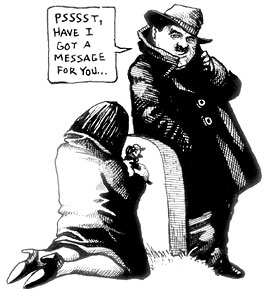
Watching James Van Praagh work a crowd or do a one-on-one reading is an educational experience in human psychology. Make no mistake about it, this is one clever man. Some skeptics may see him, at best, as morally reprehensible, but we should not underestimate his genuine theatrical talents and his understanding, gained through years of experience speaking with real people outside the limitations of the laboratory, of what touches some of the deepest human emotions. Van Praagh masterfully uses his ability and learned skills in the three basic techniques he uses to “talk” to the dead:
- Cold Reading. Most of what Van Praagh does is what is known in the mentalism trade as cold reading, where you literally “read” someone “cold,” knowing nothing about them. He asks lots of questions and make numerous statements, some general and some specific, and sees what sticks. Most of the time he is wrong. His subjects visibly nod their heads “no.” But, as noted above, he only needs an occasional hit to convince his clientele he is genuine. Sometimes he gets lucky, and as mentalists note, you always take credit for lucky hits.
-
Warm Reading. This is utilizing known principles of psychology that apply to nearly everyone. For example, most grieving women will wear a piece of jewelry that has a connection to their loved one. Katie Couric on The Today Show, for example, after her husband died, wore his ring on a necklace when she returned to the show. Van Praagh knows this about mourning people and will say something like “do you have a ring or a piece of jewelry on you, please?” His subject cannot believe her ears and nods enthusiastically in the affirmative. He says “thank you,” and moves on as if he had just divined this from heaven. Most people also keep a photograph of their loved one either on them or near their bed, and Van Praagh will take credit for this specific hit that actually applies to most people.
Van Praagh is clever at determining the cause of death by focusing either on the chest or head areas, and then exploring whether it was a slow or sudden end. He works his way down through these possibilities as if he were following a computer flow chart and then fills in the blanks. “I’m feeling a pain in the chest.” If he gets a positive nod, he continues. “Did he have cancer, please? Because I’m seeing a slow death here.” If he gets the nod, he takes the hit. If the subject hesitates at all, he will quickly shift to heart attack. If it is the head, he goes for stroke or head injury from an automobile accident or fall. Statistically speaking there are only half a dozen ways 90% of us die, so with just a little probing, and the verbal and nonverbal cues of his subject, he can appear to get far more hits here than he is really getting.
-
Hot Reading. Mentalist Max Maven informed me that some mentalists and psychics also do “hot” readings, where they obtain information on a subject ahead of time. I do not know if Van Praagh does research or uses private detectives to get information on people, but I have discovered from numerous television producers that Van Praagh consciously and deliberately pumps them for information about his subjects ahead of time, then uses that information to deceive the viewing public that he got it from the spirit world. Leah Hanes, for example, a producer and researcher for NBC’s The Other Side, explained to me how Van Praagh used her to get information on guests during his numerous appearances on the show (interview on April 3, 1998):
I can’t say I think James Van Praagh is a total fraud, because he came up with things I hadn’t told him, but there were moments on the show when he appeared to be coming up with fresh information that he got from me and other researchers earlier on. For example, I recall him asking about the profession of the deceased loved one of one of our guests, and I told him he was a fireman. Then, when the show began, he said something to the effect, “I see a uniform. Was he a policeman or fireman please?” Everyone was stunned, but he got that directly from me.
Deception or Self-Deception?
When I first began following Van Praagh I thought perhaps there was a certain element of self-deception on his part where, giving him the benefit of the doubt (he does appear likable), he developed his cold- and warm-reading techniques through a gradual process of subject feedback and reinforcement, much like the operant conditioning of a rat through “shaping,” where one rewards partial behaviors until the target goal is reached. For example, some gurus come to believe in their own divinity when enough of their followers tell them they are divine. We skeptics are only too aware of the power of self-deception in areas involving memory.
Human behavior is enormously complex, so I suppose it is possible that Van Praagh is both deceiving and self-deceiving, but over the years I have observed much more of the former than the latter. During the Unsolved Mysteries shoot, which lasted 10 hours and was filled with numerous breaks, Van Praagh would routinely make small talk with us, asking lots of questions and obtaining information, which he subsequently used to his advantage when the cameras were rolling.
Is it possible he does not consciously realize that he is doing this? I contacted numerous mentalists about Van Praagh and they assured me that it is extremely unlikely he is self-deceiving because these are techniques that they use, and they do so consciously and purposefully. I was told that I was being naive in trying to give Van Praagh the benefit of the doubt. I spoke to an individual who works a 900-psychic hotline, who is a skeptic but believes there might be “some” psychic abilities. He knows Van Praagh, and many of the people who work with him in that industry (unfortunately he will not speak out for the record), and he assures me that Van Praagh is not self-deceived. The psychic industry consensus, this source tells me, is that James Van Praagh knows exactly what he is doing.
Caught Cheating
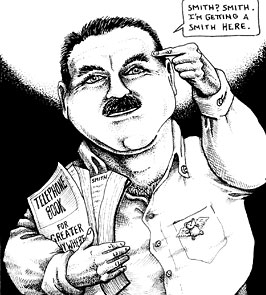
Even for seasoned observers it is remarkable how Van Praagh appears to get hits, even though a closer look reveals that he does not. When we were filming the 20/20 piece, I was told that though overall he had not done well the night before, he did get a couple of startling hits — including the name of a woman’s family dog. But when we reviewed the videotape, here is what actually happened. Van Praagh was bombing in his reading of a gentleman named Peter, who was poker-faced and obviously skeptical (without feedback Van Praagh’s hit rate drops by half). After dozens of misses, Van Praagh queried, “Who is Charlie?” Peter sat there dumfounded, unable to recall if he knew anyone of significance named Charlie, when suddenly the woman sitting in back of him — a complete stranger — blurted out “Charlie was our family dog.” Van Praagh seized the moment and proclaimed that he could see Charlie and Dad taking walks in heaven together. Apparently Van Praagh’s psychic abilities are not fine-tuned enough to tell the difference between a human and a dog.
The highlight of the 20/20 piece, however, was a case of hot reading that Van Praagh denied having done. On a break, with the video camera rolling, while relaxing and sipping a glass of water, he suddenly called out to a young woman named Mary Jo: “Did your mother pass on?” Mary Jo shook her head no, and then volunteered “Grandmother.” A full 54 minutes later Van Praagh turned to her and said: “I want to tell you, there is a lady sitting behind you. She feels like a grandmother to me.”
Van Praagh suspects he might have been set up by 20/20. I can assure you he was not. In this particular incident, for example, neither he nor the producers were aware that the camera was on during the break. When I was there they asked me about the grandmother hit, and I explained that I would have guessed that myself — because of the woman’s age it would more likely be a grandparent than a parent, and from there you have a 50/50 shot. Just then one of the line producers said, “you know, I think he got that on the break. Too bad we don’t have it on film.” After checking they discovered they did, so Van Praagh was caught red-handed. But when confronted by 20/20 correspondent Bill Ritter with the video clip, he proclaimed: “I don’t cheat. I don’t have to prove… I don’t cheat. I don’t cheat. I mean, come on….” Interesting. No one said anything about cheating. Van Praagh is denying his own self-imposed charge.
As an example of the power of the belief engine to distort reality, even after we busted Van Praagh, Barbara Walters concluded in the wrap-up discussion:
I was skeptical. I still am But I met James Van Praagh. He didn’t expect to meet me. He knew that my father’s name was Lew — Lewis he said — and he knew that my father had a glass eye. People don’t know that.
Ritter, doing his homework on this piece to the bitter end, replied:
You told me the story yesterday and I told you I would look and see what I could find out. Within a few minutes I found out that your father’s name was Lew and that he was very well known in show business. And this morning I was looking in a book and found a passage that says he was blind in one eye — an accidental incident as a child — and he had a glass eye. If I found that out, then he could have.
While Walters flustered in frustration, seemingly groping for some vestige of hope, Hugh Downs declared without qualification: “I don’t believe him.”
Where have we heard all this before? A hundred years ago, when mediums, seances, and spiritualism were all the rage in England and America, Thomas Henry Huxley concluded, as only he could in his biting wit, that as nonsensical as it was, spiritual manifestations might at least reduce suicides: “Better live a crossing-sweeper than die and be made to talk twaddle by a ‘medium’ hired at a guinea a seance.”
Strange that this phenomenon would repeat a century later. Perhaps Marx was right when he wrote in the Eighteenth Brumaire that “Hegel remarks somewhere that all great, world-historical facts and personages occur, as it were, twice. He has forgotten to add: the first time as tragedy, the second as farce.” In this case, death is the tragedy, Van Praagh is the farce.
The Tragedy of Death
The simplest explanation for how James Van Praagh can get away with such an outrageous claim on such slim evidence and questionable techniques is that he is dealing with a subject the likes of which it would be hard to top for tragedy and finality — death. Sooner or later we all will face this inevitability, starting, in the normal course of events, with the loss of our parents, then siblings and friends, and eventually ourselves. It is a grim outcome under the best of circumstances, made all the worse when death comes early or accidentally to those whose “time was not up.” As those who traffic in the business of loss, death, and grief know all too well, we are often at our most vulnerable at such times. This reality can cause the most controlled and rational among us to become emotional.
I experienced the full force of this reality on April 2, 1998. The events of that day prompted me to consider what I would say to someone who is grieving. The ABC television program 20/20 came to my home and office, then followed me to Occidental College to shoot some background footage in my critical thinking course. I thought I would ask the students to respond to the question I typically receive from journalists: “What’s the harm in what James Van Praagh does?” The students had plenty to say, but one woman named Melissa told a personal story about how her Dad had died when she was 10 and that she has never really gotten over it. She was sad that her father never got to see her play volleyball or basketball, or to see her graduate from High School. Her opinion of James Van Praagh was less than charitable, to say the least. She could not imagine how such a performance could make someone feel better about death. In a maturity beyond her years, she expressed her opinion that one does not really get over such a loss; one just learns to live with it: “When my dad first died I just wanted to get on with my life and not let it bother me too much, now I’m just trying not to forget him. Next year when I turn 20 I will have lived 10 years with my Dad and 10 years without him … so I guess that is when my life will begin … like a new chapter or something.” At this point she was fighting back her tears. It was a very touching moment.
When I returned home I was preparing to send Melissa an e-mail expressing how tragic it must be to lose her Dad at such a young age, when I opened an e-mail from my sister, who wrote:
I was thinking of Dad today on this 12th anniversary and how proud he would have been of you and all you have accomplished with your life. For some reason, I have really been missing him lately, more than I have in a long time and it’s still so hard to be without him. I really hope there is a heaven, even though I know otherwise, but the thought of never seeing him again, ever, is almost too hard to bear.
Love you, Tina.
Our father died 12 years ago that day, April 2, 1986, and it is probably a good thing I had not realized that in class as it would have been very difficult to remain composed.
This was such a peculiar conjuncture of events that it prompted me to give some thought about what I would say to someone in grief. Having watched James Van Praagh now for nearly five years, I would imagine he might say something to this effect:
It’s okay Melissa, your Dad is here now in the room with us. He’s telling me he loves you. He says he watches over you. He loves watching you play basketball and volleyball. He saw you graduate. He is with you always. Don’t be sad. Don’t cry. You will get to see him again. Everything is fine.
My response to Melissa, and to everyone who has ever received a “reading” from Van Praagh, is as follows:
First of all, no one knows if any of this is true, but even if it is, why would your loved one talk with this guy you don’t even know? Why would he choose to make his appearance in some television studio or at some hotel conference room with hundreds of other people around? Why doesn’t he talk to you instead? You’re the one he loves, not this guy getting $40 a seat in a hall with 400 people, or $200 a private reading, or two million dollars for a book filled with this sort of drivel. Why do you have to pay someone to talk to your loved one?
In the St. Louis Post Dispatch (March 1, 1998) Van Praagh called me a “rat fink.” I take this as a compliment because to “rat” on someone is to tell the truth about them. In Mafia circles it means a crime has been exposed. On the 20/20 show Van Praagh offered this view of the difference between my work as a skeptic and his as a psychic: “He makes his life beating people down, putting people down. I make my life healing and bringing people up. I’m not a circus act. I’m not a side show. It’s God’s work.” By now nearly everyone in America has heard what James Van Praagh says to aching hearts. Here is what I might say. It is not God’s work, but you judge who is putting people down or bringing them up. To Melissa, to my sisters Tina and Shawn, and to my own daughter Devin should I die before my time, I dedicate this essay and close with this statement:
I am sorry this happened to you. It isn’t fair. It isn’t fair at all. If I were you I would feel cheated and hurt; I might even be angry that I didn’t get more time with my Dad. You have every right to feel bad. If you want to cry, you should. It’s okay. It’s more than okay. It’s human. Very human. All loving, caring people grieve when those they love are gone. And all of us, every last one of us, will experience this feeling at some point in our lives. Sometimes we grieve very deeply and for a very long time. Sometimes we get over it and sometimes we do not. Mostly we get on with our lives because there is nothing else we can do. But loving, caring people continue to think about their loved ones no matter how far they have gotten on with their lives, because our lost loved ones continue to live. No one knows if they really continue to live in some other place — I suspect not — but we do know for sure, with as much certainty as any scientific theory or philosophical argument can muster, that our loved ones continue to live in our memories and in our lives. It isn’t wrong to feel sad. It is right. Self-evidently right. It means we love and can be loved. It means our loved ones continue to live because we continue to miss them. Tears of sadness are really tears of love. Why shouldn’t you cry for your Dad? He’s your Dad and you love him. Don’t let anyone try to take that away from you. The freedom to grieve and love is one of the fundamentals of being human. To try to take that freedom away on a chimera of feigned hope and promises that cannot be filled is inhuman. Celebrate your love for your Dad in every way you can. That is your right, your freedom, your humanness.
This article can be found in
volume 06 number 1
Science & Society
this issue includes: E.O. Wilson Interview; Skeptical of Objective Journalism; GRE as Fringe Science; Drug Policy Debate Guide; Fraud in the Name of Religion?; New Age High Tech…
BROWSE this issue >
ORDER this issue >
This article was published on February 3, 2011.


